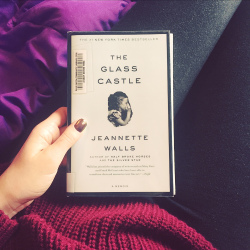If you think your parents are odd, you probably haven’t read Jeannette Walls’ memoir, The Glass Castle. One of my reading intents for 2018 is to pick up more non-fiction, and The Glass Castle gave me an easy start– it reads like a fictional coming-of-age story while further impressing readers with its ties to reality.
 About the book: From an incident involving a stove fire and subsequent hospitalization at the age of three, Jeannette takes readers on a scenic trip through her eccentric childhood. Her adventurous parents are fond of the “skedaddle,” checking out of hospitals, homes, and whole states Rex Walls style– quickly and without paying the bills. Jeannette and her siblings are given a very free rein as her parents shuttle them from town to town, trying to strike it rich by finding gold or making it as an artist. Jeannette has grown up in the midst of her parents’ grand dreams, including the infamous Glass Castle, an elaborate home Rex would like to build for his family. None of them are short on dreams, but neither parent is inclined to hold a job for long and they take the ensuing years of poverty as part of the adventure– an adventure their children are fated to endure right along with them. From sleeping in cardboard boxes to using a back window as a front door and counting a yellow bucket as “indoor plumbing,” the adventure goes on and on, until it seems more like a trap to be escaped.
About the book: From an incident involving a stove fire and subsequent hospitalization at the age of three, Jeannette takes readers on a scenic trip through her eccentric childhood. Her adventurous parents are fond of the “skedaddle,” checking out of hospitals, homes, and whole states Rex Walls style– quickly and without paying the bills. Jeannette and her siblings are given a very free rein as her parents shuttle them from town to town, trying to strike it rich by finding gold or making it as an artist. Jeannette has grown up in the midst of her parents’ grand dreams, including the infamous Glass Castle, an elaborate home Rex would like to build for his family. None of them are short on dreams, but neither parent is inclined to hold a job for long and they take the ensuing years of poverty as part of the adventure– an adventure their children are fated to endure right along with them. From sleeping in cardboard boxes to using a back window as a front door and counting a yellow bucket as “indoor plumbing,” the adventure goes on and on, until it seems more like a trap to be escaped.
” ‘You can’t quit your job,’ I said. ‘We need the money.’ ‘Why do I always have to be the one who earns the money?’ Mom asked. ‘You have a job. You can earn money. Lori can earn money, too. I’ve got more important things to do.’ “
The Glass Castle is a tale of questionable parenting, but there’s no denying the love. Jeannette’s parents may make some truly awful decisions about the family’s living situations and their children’s basic needs, but they do have hearts full of love, some great advice, and open minds. In some ways they’re careless, but in other ways they’re enviably carefree. Jeannette writes it all without that sickly sweet element of sentimentality that would make the book read too much like a list of morals. She offers no reprimand to the adults that made beds for their children out of cardboard boxes or sneakily ate giant chocolate bars while their kids went hungry. Jeannette tackles these details with the adventurous spirit of the child she was, admitting that some of the hardships were actually fun and exciting. Her older, wiser self is apparent in the details she chooses to share and the pointed way she ends certain segments of her story, but she refrains from guiding the reader too blatantly down a path of judgment and resentment.
” ‘Erma can’t let go of her misery,’ Mom said. ‘It’s all she knows.’ She added that you should never hate anyone, even your worst enemies. ‘Everyone has something good about them,’ she said. ‘You have to find the redeeming quality and love the person for that.’ ‘Oh yeah?’ I said. ‘How about Hitler? What was his redeeming quality?’ ‘Hitler loved dogs,’ Mom said without hesitation.”
The power from the story comes from two places: the first is the disillusionment concerning one’s parents. No matter how different the reader’s own past may be, growing up and learning that your parents aren’t invincible or even always good is a hard lesson. Many readers can relate to discovering that their parents have lied, that some of their plans are no more than fantasies that will never come to pass, that they’re more focused on their own lives than their children’s. There are some wonderful people in the world, and certainly some of them are parents, but even in the best of circumstances it can be difficult to suddenly see one’s parents as people, rather than solely as parents, the forces that make the world an inhabitable place and answer all of one’s questions. This shift in perspective is what The Glass Castle explores, and the juxtaposition of Jeannette’s childhood opinions with her adult writing style tackle it aptly.
“As awful as he could be, I always knew he loved me in a way no one else ever had.”
The other point of power in this story is the relationship between Jeannette and her siblings. Their parents may have had a unique way of raising children, but the four of them could always rely on each other to understand the workings of their family. Although they may not have confided every thought that entered their heads, the four siblings stand firmly together when the other schoolkids bully them about their living situation or despicable grown-ups try to take advantage of them. It’s an enviable closeness, and a remarkable example of reliability considering the poor example set by their parents, and any reader with siblings of his/her own or even close friends will recognize certain aspects of the relationship. Whether with siblings or not, it’s the sort of friendship one aspires to find in their own life, and often its the most positive point in Jeannette’s story.
“Other kids wanted to fight us because we had red hair, because Dad was a drunk, because we wore rags and didn’t take as many baths as we should have, because we lived in a falling-down house that was partly painted yellow and had a pit filled with garbage, because they’d go by our dark house at night and see that we couldn’t even afford electricity. But we always fought back, usually as a team.”
My reaction: 5 out of 5 stars. For a while this was just a wacky story, but by the end I was feeling all the emotions and I knew I’d be thinking about this book for a long time. Despite its specificity, The Glass Castle offers lessons for readers from all walks of life; it’s not just about poverty, but about transformation. It’s about chasing one’s dreams instead of letting them die. It’s about making something out of nothing. Turning a bad fortune around. I found it very uplifting, especially in the last third of the book, and I had such a good experience reading this one that I’m encouraged to pick up more memoirs. I’ve got a couple in mind, but I’m fairly new to the genre and would appreciate suggestions!
Further recommendations:
Are you reading anything outside of your normal comfort zone this year?
Sincerely,
The Literary Elephant
Advertisements Share this:





